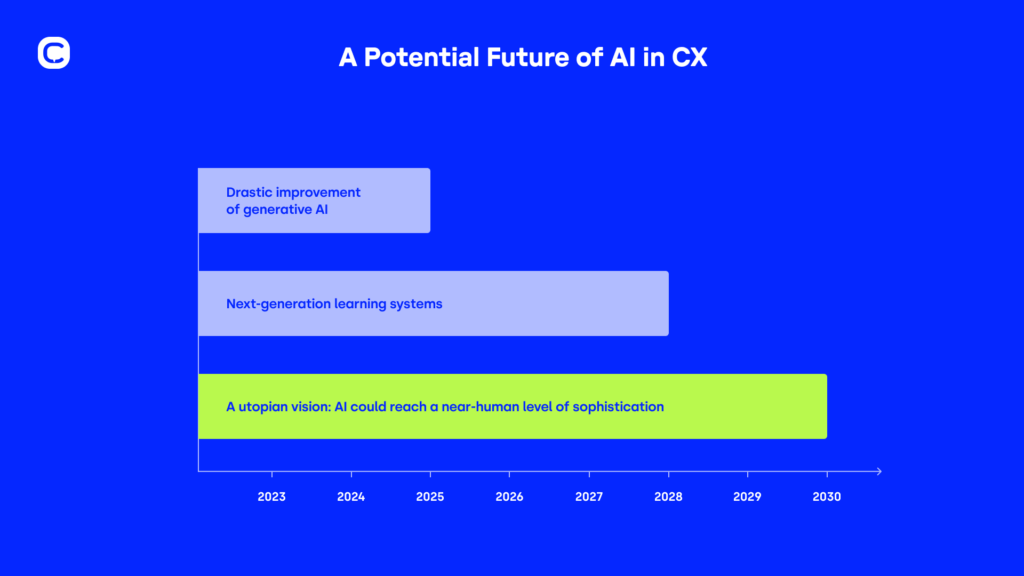95% Of Your Customer Interactions May Be AI-Powered By 2025. Here’s How to Make The Most of It

Currently, 83% of executives consider AI a strategic priority for their business. What’s more, 87% of global organizations believe that artificial intelligence will give them a competitive edge – that’s 12% more than the previous year. Why? They realized that implementing AI is no longer optional. It’s a game changer for most sectors, especially customer experience.
So, here’s a thought we’d like to share with you: If you don’t harness AI, it may slowly drown your business.
Here’s why ⬇️
The Booming AI Market May Reach $1 Trillion By 2030
In 2016, Twitter introduced Tay – an experimental chatbot that could mimic basic discussion. It turned out to be a massive failure since Tay quickly changed from a fun chit-chat partner into a racist, misogynist, and antisemite.
Only 6 years later, OpenAI introduced ChatGPT to the public – a revolutionary tool that generates human-like text in response to just about any prompt (as long as your topic of inquiry is polite, politically correct, and took place before 2021). The ChatGPT era kicked off an extraordinary evolution in AI.
Just consider the numbers:
The global AI market value has suppressed $136 billion in 2022 and is predicted to grow by 13 times over the next 7 years. It is on track to expand at an impressive CAGR (Compound Annual Growth Rate) of 38.1% between 2022 and 2030. By the year 2030, it may exceed $1 trillion.
Let’s hone in on the customer experience market. Researchers estimate AI’s value to cross $13 billion by 2028 with a CAGR of 8.62% as customers’ demand for personalization and efficiency grows rapidly each year.
AI Decreases Your Resolution Time By 35%
In a recent survey conducted by Aithority.com, 82% of respondents predicted that customer satisfaction will be the highest priority for call centers in 2025.
No wonder call centers are an obvious target for AI.
Artificial intelligence can process an amount of data at a pace that humans just can’t. According to the American National Bureau of Economic Research, AI assistance can boost agents’ overall productivity by 14% and help them complete their tasks 35% faster. Advanced AI tools even help agents with 2 months of experience perform on a level of those with over 6 months of experience.
Hence, they can provide faster, more quality service, resulting in happier customers.
In a recent article on AITHORITY.com, Brad Beumer, Customer Experience and Contact Center Automation Lead at UiPath, said:
“With AI-powered automation, organizations can reduce the amount of data processing required by humans, lowering error rates and the need for rework. For example, Transcom embraced UiPath’s business automation platform and the company has saved over 60,000 hours a year, with 2,000,000 tasks executed yearly.”
Brad Beumer
Customer service specialists also agree with the importance of AI in their profession – 62% of them say that automation helps them understand their customers better. Another study states that 71% of CS professionals think AI is helping them to spend more time on the tasks they enjoy the most. This may significantly decrease agent turnover – one of the biggest issues in customer service nowadays.
Before we dig into the latest AI trends, we’d like to share a little hors d’oeuvres, if you will. This is what Daniele Buonaiuto – a Chief Information Officer at MSC Cruises – says about the role of AI in customer experience:
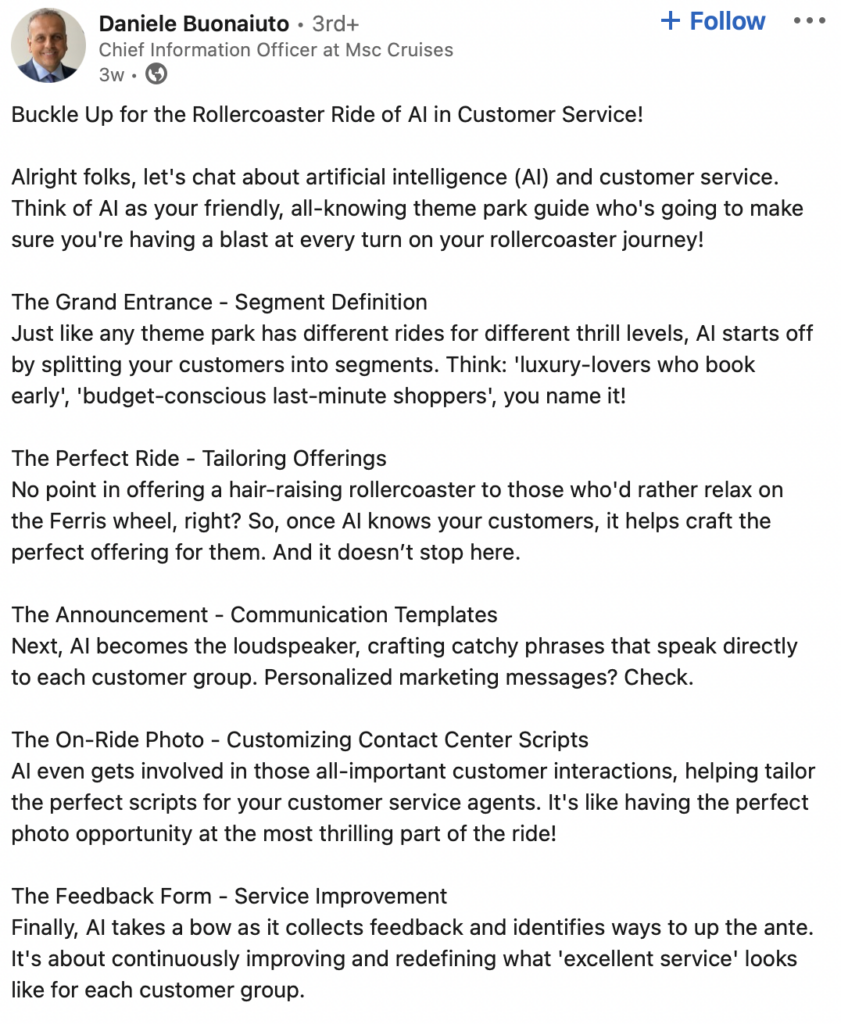
4 AI Trends That Are Moving The Market
Let’s take a look at 4 remarkable CX-focused AI tools and their impact on businesses.
These trends show how necessary it is to incorporate AI into your customer service strategy. AIOps helps you anticipate issues and address them before they have the chance to impact your customers. This kind of proactive approach demonstrates your commitment to exceptional service.
Let’s take a look at aforementioned trends:
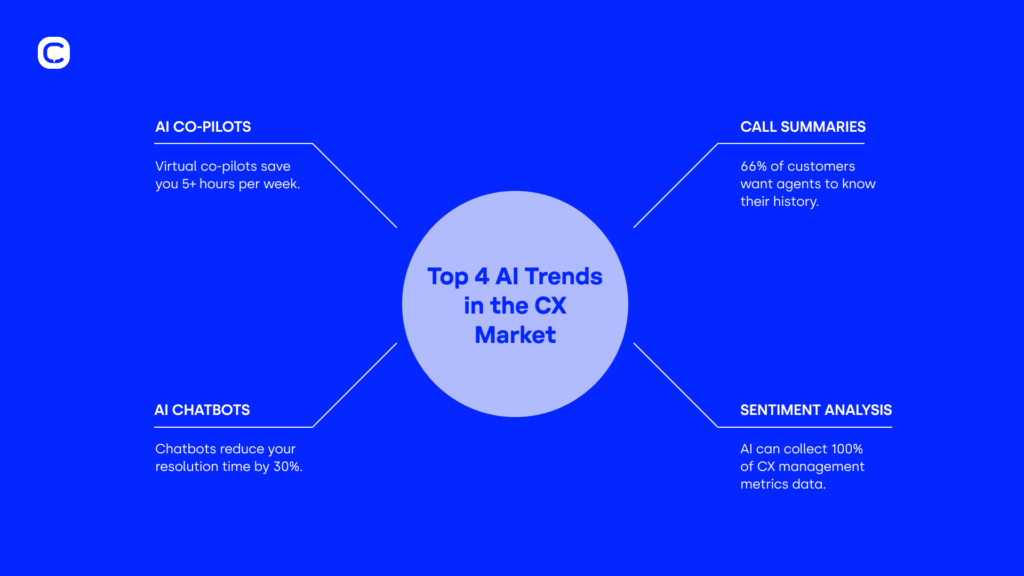
AI Co-pilots Can Save You Up to One Day’s Worth Of Work Per Week
Your agents may need to examine as many as 20 systems to resolve a single customer’s issue. The concept of AI co-pilots is here to change that. Think of it as a robotic assistant that scrapes all your available educational materials and provides agents with the exact knowledge they need in real time so that they can provide quick and accurate service. According to the portal balticassist.com, deploying an AI co-pilot can save you as much as 5+ hours per week on customer service – almost 1 working day.
Let’s look at an example of what AI co-pilots can do for you. Let’s say a customer is asking questions about their insurance eligibility. Normally, an agent has to find the right document, read through it, sort the important information, and so on. This all can be done by AI in seconds. All the agent has to do is present the findings.
In fact, we conducted a little research ourselves – 54% of our respondents believe that task automation will help their business keep up with growing customer expectations, and 31% specifically mentioned virtual co-pilots.
“Xero, a cloud accounting platform for small businesses, uses our product to offer high-quality customer support. Around 95% of questions asked at Xero are answered by self-service help content powered by Coveo, deflecting over a million queries from Xero’s support team each month. Proactive AI-driven content recommendations help customers find what they’re looking for as they’re searching.”
Patrick Martin, GM of Service in Coveo, AITHORITY.com
The Utopian Future of AI co-pilots
AI co-pilots will likely undergo an interesting evolution in the next couple of years: they may become AI agents — that is, robotic reps who can take the reins from human agents.
The context-aware processing market is already booming. It’s predicted to reach $5.3 billion worldwide by 2024. Servion Global Solutions estimates that AI will power 95% of customer interactions by 2025 – that is 19 out of 20 of them.
In fact, our CEO Martin Malych believes that in a few years, CloudTalk will fully automate 3 out of every 4 calls. This level of automation will give you complete freedom to set the agenda for your customer support agents, boosting productivity across your entire call center operation.
AI Chatbots Saved the Banking Industry Close to $6 Billion
AI chatbots are nothing new. So why are we covering them now? The advancement of AI in 2023 represents the dawn of a whole new era for these virtual helpers. Gartner expects a significant increase in chatbot value for contact centers within the next 2 years. Deloitte claims that 9 in 10 customer service leaders plan to invest in chatbots during this period.
Actually, Deloitte research proved that as much as 74% of organizations are already testing them. No surprise there, since according to the research firm SkyQuest, chatbots saved the banking industry close to $6 billion during 2021.
Today’s AI chatbots can also reduce your resolution time by 30%. In practical terms, you may save an average of 2 hours and 20 minutes per day. That translates to almost 6 standard working days per month.
“Contact center managers could utilize AI-powered chatbots for assisting human reps while offering contextual guidance to customers in a way that showcases the highest quality of service. Chatbots have the power to generate accurate responses to complex customer queries and address specific business needs. Thus, they are freeing valuable time for human agents which they can utilize to attend to other important tasks.”
Kevin Bobowski, CMO at Aware, AITHORITY.com
While many may question the positive impact AI chatbots can have on customer satisfaction, the data is clear: 6 out of 10 customers would rather interact with a chatbot than wait for a human agent to answer their call.
Another research study conducted by SkyQuest shows that 74% of customers prefer chat over telephone conversations – it’s convenient, quick, and allows you to multitask while solving your issues.
Here’s what Gamma – a leading British UCaaS telecommunication company – thinks about using AI chatbots to boost customer experience:
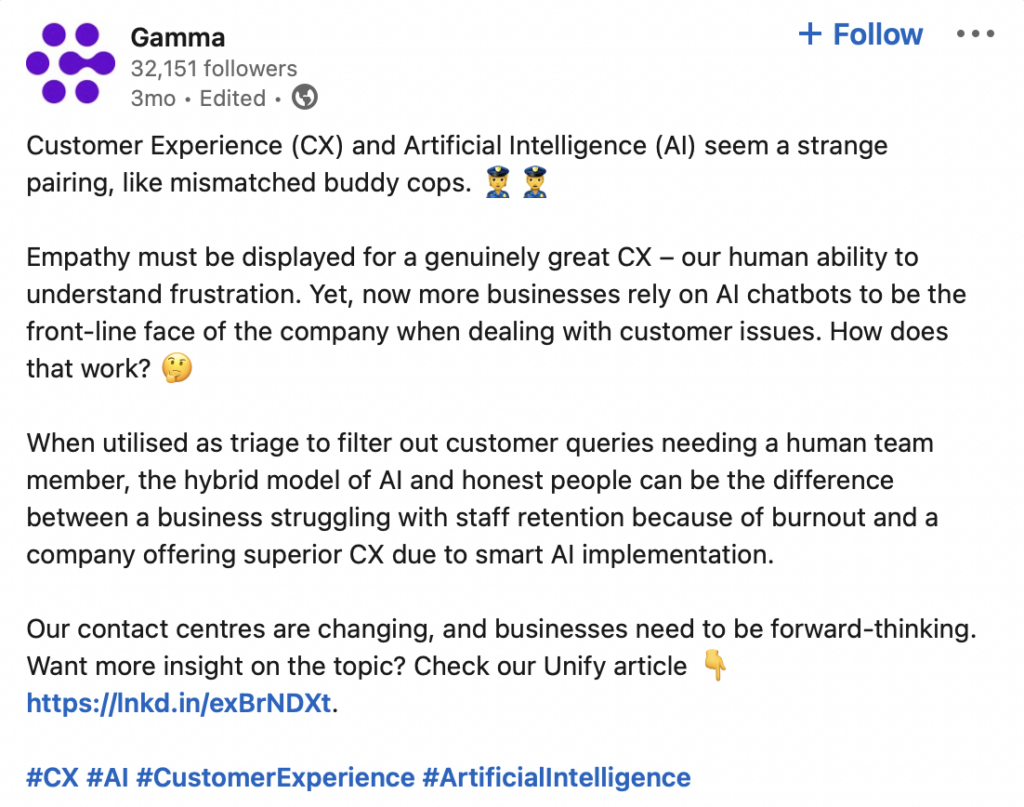
See Each Customer’s Interaction History Before Picking up the Phone With Call Summaries
Call summaries are another type of task that lends itself to AI optimization. That’s because it’s a base for some pretty viral tools – the most famous being the one we opened this blog with. ChatGPT reached 1 million users within 5 days in 2022. In early 2023, the tool already had over 100 million monthly users. So, we can say that generative AI (including call summaries) is a pretty profitable ground to land on.
Cecil Sunder – Director of Data and AI at Microsoft – on adopting ChatGPT in customer service and customer experience:

We can describe call summaries as an automated recap of each finished call. A call summary gives you a comprehensive overview of the entire customer interaction. Including call transcript, main highlights, or even recommendations about what an agent could have done better. In seconds, you have a wealth of material that can help you drastically improve your service.
What’s more, it provides you with a whole new level of personalization. Those working in the customer service industry know that having to repeat information is what customers hate the most.
The numbers prove it – 66% of customers want agents to be aware of their interaction history with a given company. Knowing not only what your customers’ issue was but even what exactly they said in the last phone call can boost their satisfaction and reduce churn.
Sentiment Analysis Predicts Your CSAT Scores With 87% Accuracy
AI can recognize the smallest nuances in customers’ language and estimate how satisfied they were with your service. It’s capable of analyzing customer feedback and searching for keywords or tone of voice to identify positive or negative sentiment.
An example of how an audio sentiment analysis may look like:
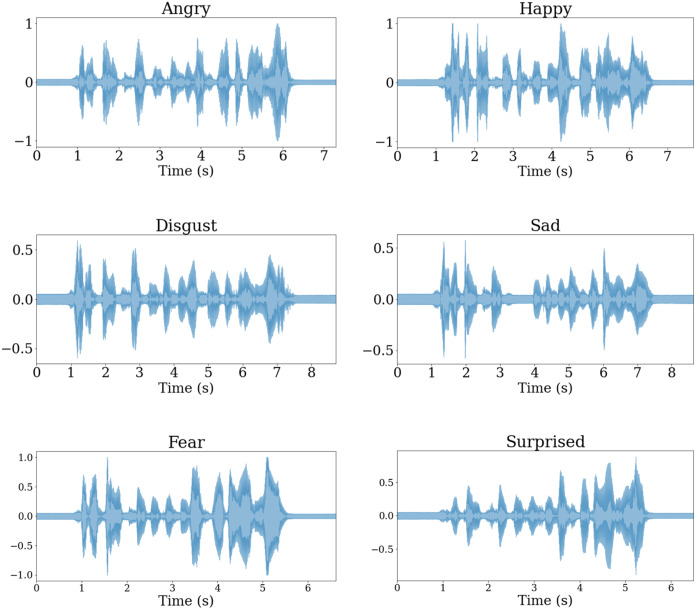
Image source: https://www.sciencedirect.com/science/article/abs/pii/S0950705121005785
But the most impressive thing about AI sentiment analysis is the volume of information it can process. Instead of capturing a small percentage of responses, you can use artificial intelligence to collect 100% of the data from customer experience management metrics like NPS (Net Promoter Score), CSS (Customer Service Satisfaction), CES (Customer Effort Score), or CSAT (Customer Satisfaction Score). Remarkably, AI sentiment analysis is capable of predicting CSAT scores with an 87% accuracy rate.
The outcome? Instead of making big-budget decisions based on a small percentage of feedback (in essence, wasting your money), a large volume of CSAT data helps you understand your customers better and enhance your CX. In fact, 48% of businesses already use AI to improve the efficiency with which they collect and utilize data.
“Analyzing customer interactions in real-time to detect sentiment, recurring themes and emotional cues allows decision-makers to identify customer dissatisfaction or potential escalations early on. They can intervene to provide prompt assistance or address issues proactively.”
Kevin Bobowski, CMO at Aware, AITHORITY portal
Success Story: How Zuri Automated 84% of Zurich Middle East’s Support Processes
When thinking about the best example of a success story of AI for customer experience, the first business that comes to our mind was the Zurich Middle East – a branch of Zurich Insurance Group, one of the largest insurance companies in the world.
The issue with the insurance business is that customers have tons of tricky questions, urgent issues, service requests, and so on. The majority of these cases require immediate answers and speedy resolutions – something that is difficult to achieve in busy, solely human-led call centers.
Zurich Middle East harnessed the power of conversation intelligence to deploy a virtual assistant named Zuri. Zuri is available 24/7, processes data immediately, and eliminates the potential for human error – all things which are critical to success in the insurance industry.
Zuri has produced quite impressive results in just a short period of time. Over the course of the first 6 weeks, 25% of visitors engaged with the bot. It managed to automate 84% of customer service processes with 70% of customers getting their queries resolved end-to-end solely by the virtual assistant.
The CX Market as We Know It Has 7 Years
As we (hopefully) proved, AI for the customer experience market is a booming industry, growing rapidly year over year.
If we haven’t convinced you by now, this may do the job:
Between 2023 and 2025, generative models in content creation will likely develop drastically – there’s a good chance you’ll be able to generate more high-quality content than you can today. For example, a perfectly personalized sales pitch email.
Between 2025 and 2028, advancement in optimizing algorithms is predicted to boost the capabilities of learning systems – you would be able to integrate new agents in no time.
Between 2028 to 2030, professionals dream of AI getting close to human-level sophistication.
That would forever redefine the way we all do business.
